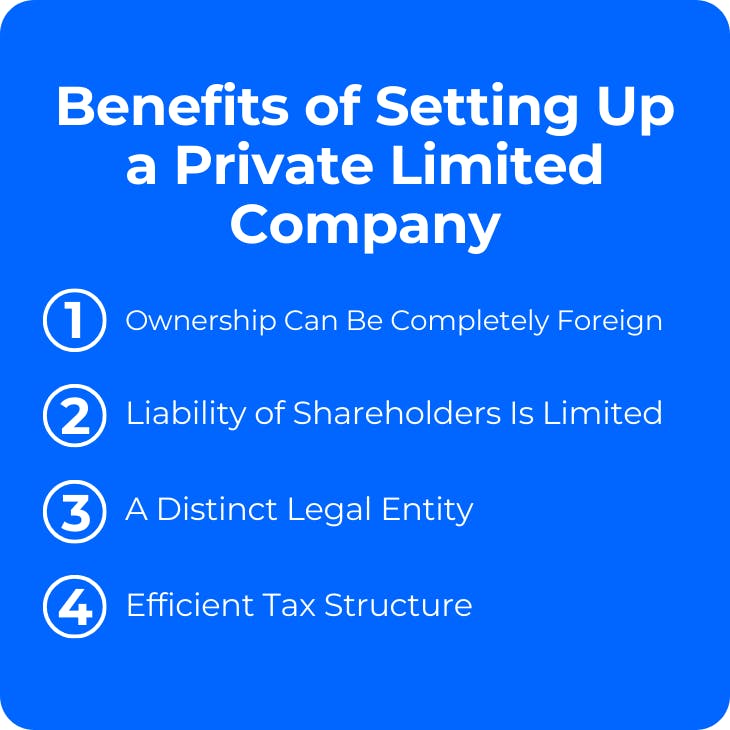A private limited company is a company limited by shares where the shareholders' liability is restricted to their share subscription. It is managed by a board of directors appointed by the shareholders.
There is no minimum share capital required by law, but the common practice is to have a share capital of not less than HK$1,000.
This type of company is considered a legal person, enabling it to execute contracts, sue and be sued, and borrow money from financial institutions.
A private limited company in Hong Kong pays tax on its business profits but does not incur additional taxes on dividend declaration or capital gains, except for foreign-sourced income.
As of March 31, 2024, Hong Kong had 1,413,761 private limited companies registered locally, according to the Companies Registry. Another 14,932 non-Hong Kong private companies were registered from 83 countries.
What is a Private Limited Company?
A private limited company is a company limited by shares.
The liability of the shareholders is limited to the number of shares they have subscribed. Shareholders of a private company are not personally liable for any debts incurred by the company.
Typically, private companies often restrict the transfer of shares. If the Articles of Association do not restrict the transfer, the company may still refuse to register the transfer.
Structure of a Private Limited Company
A private limited company is a distinct legal entity managed by a board of directors. The shareholders of the company appoint the directors.
Directors are responsible for managing the company's affairs and can appoint officers to oversee the day-to-day operations.
Here are the minimum requirements one must fulfill to set up a private company in Hong Kong:
| Requirement | Details |
|---|---|
| Director | At least one director (individual); can be a resident or non-resident of Hong Kong |
| Shareholder | At least one shareholder (individual or corporate); no restriction on residence or nationality; total shareholders ≤ 50 |
| Share Capital | No legal minimum, but common practice is at least HK$1,000 |
| Company Secretary | Must appoint a company secretary who is either: • A Hong Kong resident individual, or • A body corporate registered in HK |
| Auditor | Must appoint a certified auditor registered as a firm of accountants in Hong Kong |
| Register of Significant Controllers | Required to maintain a register of individuals or entities holding more than 25% of shares or voting rights, directly or indirectly |
Additionally, the company should obtain a physical address in Hong Kong. PO Box addresses are ineligible—addresses of a business center, co-working space, or residence work.
As of March 3, 2014, under the Companies Ordinance (Cap. 622), Hong Kong abolished the concept of authorized share capital and capital duty. This means companies no longer pay capital duty on their share capital.
Types of Companies in Hong Kong
While a Private Limited Company is a common choice, other structures may better suit your business needs. Understanding all options helps you make the right decision.
Here’s a quick comparison to guide you:
| Business Structure | Ownership | Liability | Capital Requirement | Public Fundraising | Best For |
|---|---|---|---|---|---|
| Private Limited Company | 1–50 shareholders | Limited | No minimum | No | Startups, SMEs, foreign investors |
| Public Limited Company | Unlimited shareholders | Limited | No minimum | Yes (Stock Market) | Large businesses, IPOs |
| Company Limited by Guarantee | No shareholders (members) | Limited | No share capital | No | NGOs, charities, non-profits |
| Private Unlimited Company | 1+ owners | Unlimited | No minimum | No | Niche businesses, professionals |
| Public Unlimited Company | Unlimited shareholders | Unlimited | No minimum | Yes | Rarely used due to high risk |
| Sole Proprietorship | 1 owner | Unlimited | No minimum | No | Small independent businesses |
| Partnership (General) | 2+ partners | Unlimited | No minimum | No | Professional firms, freelancers |
| Partnership (Limited) | 1+ general & 1+ limited partner | Limited (for LPs) | No minimum | No | Investors, firms needing liability protection |
| Branch Office | Foreign parent company | Parent company liable | No minimum | No | Foreign companies expanding to HK |
| Representative Office | Foreign parent company | Parent company liable | No minimum | No (Cannot generate profit) | Market research, promotion |
Why Private Companies Limited by Shares Are Popular:
Now that you understand the different company types, let’s dive into why the Private Limited Company is the most popular choice for businesses in Hong Kong:
1. Location
Hong Kong is strategically located and offers easy access to the Chinese market along with other Asian Pacific markets.
Thanks to the free trade agreement between the People's Republic of China and the Hong Kong SAR, businesses in Hong Kong receive preferential access to the mainland China market.
2. Attractive Trade and Tax Regime
For a company limited by shares, the taxation structure of its jurisdiction of incorporation is a key factor. Hong Kong doesn't disappoint on this front—it is regarded as one of the most tax-friendly systems in the world that doesn't levy any indirect taxes such as VAT or sales tax, and no capital gains tax.
Hong Kong also has a free trade policy, which means there are no long-drawn customs clearances needed to begin operations.
3. Competitive Economy
In 2022, Hong Kong was ranked the 5th most competitive economy among 63 economies by the International Institute for Management Development. Private companies benefit from its favorable and efficient business environment.

Benefits of Setting Up a Private Limited Company
1. Ownership Can be Completely Foreign
Hong Kong laws allow private limited companies to be set up with 100% foreign shareholding except in certain sectors such as broadcasting.
Even if you don't want any local shareholders, you can still set up your company and carry out your business. Also, Hong Kong company formation can be done remotely.
However, while most industries have no restrictions, certain sectors—like broadcasting—have foreign ownership limits.
| Sector / Area | Restriction |
|---|---|
| Free-to-Air TV Companies |
Foreign ownership requires government approval at: • 5–10% shareholding • 10–15% shareholding • Over 15% shareholding |
| Voting Rights in TV Companies | If foreign entities hold more than 49% of voting rights, their voting power is adjusted |
| Radio Broadcasting | Foreign ownership is capped at 49% |
| Licensing Eligibility | Licenses for broadcasting are only issued to Hong Kong-based companies |
| Other Industries | No foreign ownership restrictions; foreign investors can fully own and operate businesses |
| Post-Setup Compliance | Companies must meet local compliance requirements once registered |
2. Liability of Shareholders is Limited
Personal liability is limited to the amount unpaid on shares, protecting shareholders’ personal assets from company debts.
3. A Distinct Legal Entity
Under corporate laws, a company is a legal person. Companies can sue or be sued, hold assets, and enter into contracts under their own name.
4. Efficient Tax Structure
A private limited company in Hong Kong has to pay tax on its business profits. Profits tax should be paid to the Inland Revenue Department (IRD) via e-Filing or in person.
Only profits derived from or sourced in Hong Kong are taxable. Dividends and capital gains are not taxed unless caught under the Foreign-Sourced Income Exemption (FSIE) regime introduced in 2023, which applies to passive income from offshore sources.
Disadvantages of Setting Up a Private Limited Company
Although a Private Limited Company offers many benefits and is an ideal choice for businesses, it also comes with some drawbacks. Here are the key challenges to consider:
1. The Costs of Operations are High
Doing business in Hong Kong is not exactly easy on the pocket. Rent for office space, labor costs, paying company secretary and auditors, and other day-to-day expenses can quickly add up.
For a new entrepreneur doing business in a foreign location like Hong Kong with limited financial resources, this can be a potential bottleneck.
2. Incorporation is Not Straightforward
Compared to operating your business as a sole proprietorship or a partnership, incorporating a private limited company in Hong Kong can be time-consuming. For non-Hong Kong companies, it can take up to 10 working days.
This excludes the time spent on collating the necessary paperwork and completing the application.
3. The Competition is Intense
Even though the regulatory and business ecosystem of Hong Kong is extremely inviting, one cannot discount the intense competition in the market.
With an increasing number of entrepreneurs globally considering Hong Kong as their dream destination for doing business, new entrants may find it challenging to establish their presence quickly.
Should I Structure My Company as a Private Limited Company?
There’s no one-size-fits-all answer. It depends on your business goals, tax strategy, and liability concerns. Before deciding, consult a professional to understand the legal and financial implications.
A Private Limited Company is a strong option if you:
- Seek limited liability and personal asset protection
- Intend to raise external funding or onboard investors
- Operate in technology, fintech, or professional services
- Run trading or cross-border e-commerce operations
- Require IP ownership or brand protection
- Are a foreign company setting up in Hong Kong
If these apply to you, this structure is worth serious consideration.
How Can I Register a Private Limited Company in Hong Kong?

Under the Business Registration Ordinance (BRO), all businesses in Hong Kong must register with the Business Registration Office of the Inland Revenue Department. Here’s how to register a Private Limited Company step by step:
- Choose a unique company name (check availability)
- Get a Registered Office Address in Hong Kong
- Decide on share capital and appoint:
- At least one director
- One shareholder
- A company secretary
- Prepare and submit:
- Articles of Association
- Incorporation Form (NNC1)
- Notice to Business Registration Office (IRBR 1)
- Obtain certificate of incorporation and Business Registration Certificate (BRC) from the IRD
- Apply for a Business Registration Number from IRD
- Use the One-Stop Registration Service offered by the Companies Registry
- Check for industry-specific licenses
- Open a Company Bank Account for transactions and tax compliance
The entire process can be completed within one week, but certain industries may require additional approvals. Make sure to check industry-specific licensing requirements before operating.
Final Thoughts: Simplifying Your Company Registration
Given the number of steps involved in registering a private limited company in Hong Kong, it is natural to feel overwhelmed. If you are a foreign business looking to set up your presence in Hong Kong, you may not feel comfortable navigating the entire process independently.
And that's why a service like Air Corporate exists.
With Air Corporate, you can register your Hong Kong company and a bank account within just 24 hours.
FAQs
Unlike a private company which restricts share transfers and limits the number of shareholders, a public company allows its shares to be freely traded on a stock exchange.
Public companies also need to fulfill stringent reporting requirements.
Companies in Hong Kong need to file an Annual Return with the Companies Registry, which includes the updated particulars of its share capital, directors, shareholders, and assets over which any charge/security has been created.
You can issue ordinary or preference shares with special voting rights.
Your Articles of Association should include the nature/class of shares and voting rights attached to them.
A company's Articles of Association outlines the rules for how it works and describes what the company aims to do. It explains how things get done inside the company, like choosing directors and the handling of financial records.



